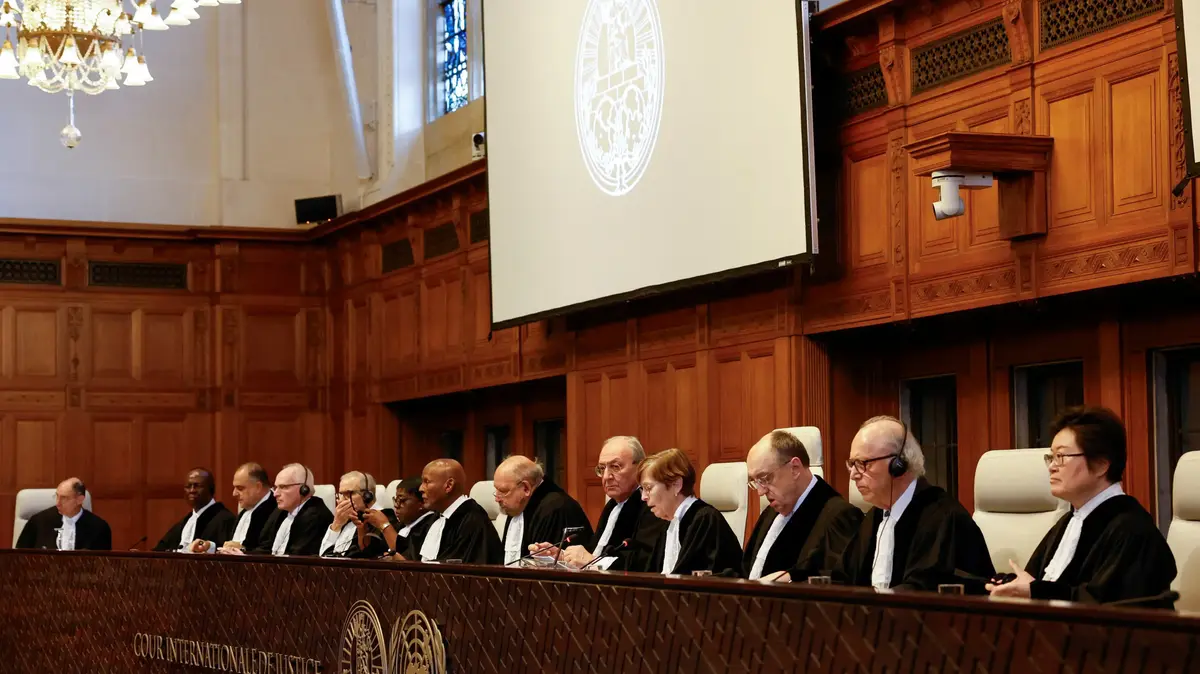It is not only political rivalry during an election period that makes the border agreement between Israel and Lebanon controversial.
In this dispute there are several substantive dimensions, which make the complicated mask of considerations for or against the agreement independent of political identity.
This means that in a matter-of-fact approach to the issue, a person can be appointed with the supporters of Yair Lapid or Benny Gantz for the Prime Ministership, and still have reservations about the agreement as it was submitted for approval by the Cabinet.
And vice versa, a person can support Netanyahu and the right-wing bloc, and still find reasons to support the agreement.
However, it is completely natural that precisely by focusing on the factual arguments that constitute the dispute, the issue will also receive a political expression.
After all, in an election campaign in a healthy democracy, parties are expected to present to the public their differences, which are focused on strategic issues that have significant implications for the future of the country.
Being such, the question of the agreement with Lebanon certainly deserves special attention in the electoral process.
"It's not just political rivalry that makes the border agreement controversial" Prime Minister at a press conference on the agreement, Photo: Olbia Pitosi/Flash 90
Nasrallah's entrance
Quite openly, the security establishment and former officials came forward to defend the agreement.
They explain that the State of Israel has an interest in Lebanon also benefiting from the gas reserves within its maritime space.
A Lebanese gas rig that will be placed near the maritime border with Israel, according to them, has a chance to establish a desirable trend for the economic and security interests of the two countries, in a mutual equilibrium in the maritime space.
This, for example, was the contribution of the trend of agricultural development and prosperity in the Jordan Valley on the Jordanian side, which already in the early 1970s, before the peace agreement, placed a mutual interest in stability in the border area.
The agreement with Lebanon opens a window of hope for the development of a similar dynamic between Israel and Lebanon.
This consideration, in anticipation of a dynamic of stability, undoubtedly has a chain of positive security consequences.
However, it is worth considering that in the scope of its contents - this consideration and similar ones are in the upper echelon of the national security equation.
This is a comprehensive equation, involving a wide range of fields, far beyond technical security considerations.
In such an examination of the agreement, the security point of view is only one of the factors in an overall equation, which requires additional experts such as Foreign Ministry experts, experts on the international energy market, experts on Israeli law on the question of the authority of a transitional government, and of course experts on international law.
The examination of the considerations in the comprehensive set is supposed to be realized in the National Security Council - the National Security Council. Because of this, the position of the head of the National Security Council, Eyal Hulta, and the joining of the former heads of the National Security Council, Major General Giora Eiland and Ephraim Halevi, have a special professional weight in their support for the agreement. Second, precisely from a comprehensive view of the national security equation in the issue, the considerations for rejecting the agreement are also necessary.
There is considerable weight to his support for the agreement, Major in the Giora Island Reserves, photo: none
Although it is possible that Netanyahu would also agree to a concession that sweeps up to 100 percent of the disputed territory, which amounts to a concession of 840 square kilometers of maritime space. However, since the end of the Netanyahu government, something has changed dramatically. Nasrallah's threat to attack the gas rigs in Israeli territory, pushed for the framework of the From a new factor that fundamentally changed the entire framework of the discussion.
If before the threat it was possible to present an Israeli concession as a gesture of goodwill, as a hand out to the Lebanese state in a deep economic crisis - after Nasrallah's unprecedented threats, the Israeli concession is captured in a contextual framework that colors it in the colors of surrender to blackmail.
In the changed context, the negotiations on the maritime border that lasted for about a decade, were integrated into a new campaign that Nasrallah designed with creative sophistication, with the aim of damaging the status and image of the strength of the State of Israel.
It is also possible that Netanyahu would have agreed to the concession, opposition leader Netanyahu, photo: Koko
The negotiations, which were conducted over the years with American mediation, have trapped Nasrallah in a framework similar to the criminals' game known as the "chicken game". In this game, two drivers drive against each other on a narrow road. Just before the meeting, in order to avoid a collision, one of the two must give up and get off To the margins. In the rules of the game, the one who gave up is the loser. At first glance, giving up in going to the margins is a rational necessity. The big question is what the price of the loss entails. A closer look will reveal that even in this story the question of the rational decision depends on the context.
Back to the analogy: from the moment Nasrallah's threat was made to demand the full acceptance of the Lebanese claim as a condition for Israeli operation of the Harish rig, the Israeli concession space fell into a trap.
Even if he is accepted by the Israeli public as correct in relation to the equation of Israeli interests, it is difficult to save him from the attachment to Nasrallah's threats.
To the extent that the Israeli concession is presented to the public as the right move, also in order to avoid the risk of a military conflict and a deterioration into war, the more it connects to the overt and covert dimensions of consciousness, which present the State of Israel in the weakness of its anxiety about a military confrontation.
The American guarantees in this context increase the damage.
With our respect
During his visit to the Northern Command, Defense Minister Gantz declared: "We have not given up and will not give up one millimeter of security."
In his announcement, he ignored the potential security consequences of the way the enemy interprets the Israeli concession.
This narrow security focus expresses the Israeli worship of the technical and physical dimensions of security, which Israeli society clings to as the almost unique common denominator for its cohesion.
In all other security dimensions beyond the technical ones, Israeli society has difficulty forging an agreement.
The Israeli worship of the technical and physical dimensions of security, Defense Minister Gantz, photo: Olbia Pitosi/Flash 90
Here arises an existential problem with cultural layers, which play a critical role in the national security equation.
Although the Israeli concession is not currently proven to lead to physical security damage, it certainly damages the basis of national honor and the image of the sovereignty of the State of Israel.
It is true that, out of progressive enlightenment, quite a few Israelis tend to underestimate the meaning of national honor, but in the new global reality, which has shaken Western Europe in the past year as well, we can learn that even today, a nation that does not know how to protect its honor may be threatened even in terms of its very existence.
In strategic dilemmas there are always sides here and there, and they are not decided only by the power of reason.
A balanced decision first of all needs an open critical dialogue, and this is exactly what is so lacking in the leadership of the State of Israel today
were we wrong
We will fix it!
If you found an error in the article, we would appreciate it if you shared it with us









